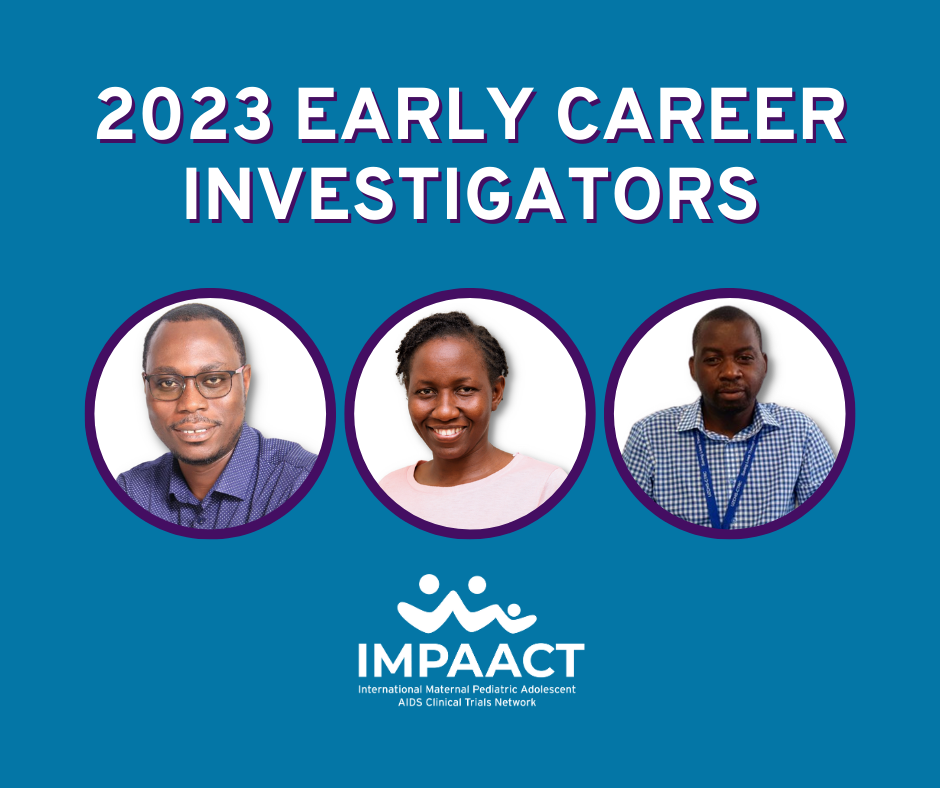Announcing the 2023 IMPAACT Early Career Investigator Award Recipients
The IMPAACT Network is pleased to announce the recipients of the Early Career Investigators Program award. The three early career investigators will complete a project using data or samples generated by IMPAACT Network studies.
CLEMENT GASCUA ADU-GYAMFI, PHD
University of the Witwatersrand
Johannesburg, South Africa
BRENDA KAKAYI, BPHARM
MU-JHU Research Collaboration CRS
Kamala, Uganda
TAGUMA ALLEN MATUBU, PHD
University of Zimbabwe Clinical Trials Research Centre
Harare, Zimbabwe

Clement Gascua Adu-Gyamfi, PHD
BIOGRAPHY
Clement Gascua Adu-Gyamfi is a Postdoctoral Fellow in Clinical Immunology at the School of Physiology, Wits Medical School as well as a Clinical Research Scientist at the Centre for Vaccines and Immunology, National Institute for Communicable Diseases, both in Johannesburg, South Africa. He has a broad background in Clinical Immunology with specific expertise in analytical method development, optimization and validation. He has vast experience in laboratory diagnostics including ELISA, Luminex based cytokine testing, flow cytometry, polymerase chain reaction (PCR) and mass spectrometry. Previously, he established and supervised a Clinical Immunology laboratory at the University of Ghana Medical School, Accra-Ghana. His research interest focuses on improving the lives of individuals with HIV through accurate diagnosis of Tuberculosis (TB). Since 2015, his research work has investigated immunoregulatory molecules that can be used as a non-sputum-based biomarker to diagnose or predict the onset of TB in individuals with HIV. He has published several research articles evaluating the plausibility of indoleamine 2,3-dioxygenase (IDO) activity as a diagnostic biomarker for active TB in people with HIV. These studies have detected IDO activity by using a product-to-substrate ratio (i.e. Kynurenine (K) to tryptophan (T) ratio). So far, IDO activity (measured as K/T ratio) has demonstrated a striking clinical significance as a tool to diagnose TB and predict the onset of active TB in people living with HIV. Furthermore, IDO activity declined with TB treatment suggesting IDO activity could be used to monitor anti-TB therapy. For the past five years, he has successfully completed several objectives of the IDO evaluation as a blood-based TB biomarker.
PROJECT
"Indoleamine 2, 3-dioxygenase as a Tuberculosis biomarker in pregnant women living with HIV."
Objectives:
- To assess the impact of pregnancy stage on IDO activity as a TB biomarker using serial samples from women enrolled in TB APPRISE during the second and third trimesters and at 12 and 44 weeks postpartum.
- To assess plasma IDO activity as a marker of IPT treatment response by treatment arm and by LTBI status in TB APPRISE.
- To explore IDO activity as a predictive biomarker of TB disease by comparing IDO activity among the 6 persons who developed TB disease versus 18 women who did not develop TB disease in TB APPRISE.

Brenda Kakayi, BPharm
BIOGRAPHY
Brenda Kakayi is the Lead Research Pharmacist for MU-JHU Care, Ltd. In Kampala, Uganda. She has worked as a research pharmacist at Makerere University-Johns Hopkins University (MU-JHU) research collaboration since 2005 and is the IMPAACT and ACTG Pharmacist of Record. She is a registered pharmacist and has had extensive experience in studies aimed at finding means of reducing mother to child transmission of HIV, best treatment options for HIV infected patients and other options in the prevention of HIV infection of HIV negative individuals, vaccines, TB prevention and treatment studies. By supporting implementation of studies in the IMPAACT, ACTG, HPTN and MTN networks, she has gained vast experience in developing pharmacy procedures/systems for the conduct of IND studies and for the appropriate handling and maintenance of study drug and pharmacy equipment with very strict adherence to the Division of AIDS (DAIDS) Pharmaceutical Affairs Branch guidelines. She has considerable experience in starting up a research pharmacy as well as coordinating pharmacy operations (including but not limited to maintaining confidentiality, adherence to both local and international regulatory requirements, procuring study products, accountability, disposal and storage conditions, client education and training of both the pharmacy and non-pharmacy staff on medications/study products). She continues to use these skills in coordinating pharmacy activities at the MU-JHU CRS. She has had the opportunity to observe how infants born to people with HIV benefit from their birth parent’s perinatal ART use. However, she has also observed that even if these infants are born without HIV, some may have different growth patterns (e.g., they may be shorter) or have more sick visits than infants not exposed to HIV. As a result, she seeks to explore and investigate the short- and long-term effects of ART that the children are exposed to perinatally in order to generate solutions that will allow these children to live healthy lives.
PROJECT
"Insulin-like growth factor/growth hormone axis alterations and stunting in HIV-exposed uninfected children from the 1077BF/P1084s study. "
Objectives:
- To investigate IGF-1, IGFBP-1 and IGFBP-3 as predictors of growth faltering/stunting in the first 2 years of life in HEU children.
- To describe the concentrations of hormonal growth factors in infants in relation to infant growth percentile at birth, 26 weeks and 74 weeks of age.

Taguma Allen Matubu, PhD
BIOGRAPHY
Taguma Allen Matubu is a Laboratory Director at the University of Zimbabwe Clinical Trials Research Centre in Harare, Zimbabwe. He is a Clinical Scientist with 18 years of clinical trials research experience. He holds a Bachelor of Medical Laboratory Sciences and Master of Science in Clinical Epidemiology. He successfully completed a PhD with the University of Zimbabwe; his thesis was entitled: Effect of Depot Medroxyprogesterone Acetate on Cell Mediated Immune Response and Cell Surface Expression of PD-1 and CTLA-4 Markers. He has extensive training and experience in setting up, optimizing, and performing complex cellular analysis using multicolour flowcytometry. He has co-authored eight publications in peer reviewed journals, three as primary author, and delivered oral presentations at major International Research Conferences. His current role as Laboratory Director is to provide operational oversight for UZ-CTRC laboratories ensuring support for seven clinical research sites and nine laboratories participating in HIV/TB/COVID-19 prevention and treatment clinical trials. He is a qualified technical assessor for the International Organization for Standardization’s (ISO)15189 compliance audits and also responsible for enforcing effective policy and procedure development and implementation to ensure compliance with local regulatory, Division of AIDS (DAIDS) and the ISO 15189 requirements. He has vast experience with setting up, validating, and managing of laboratory methods in line with Good Clinical Laboratory Practice (GCLP) and DAIDS requirements. This includes preparation and interpretation of laboratory processing chats, preparation, completion, and review of protocol analyte lists on the Milab central platform and execution of material transfer agreements as well data and information support systems such as Laboratory information Systems (LIS) and Laboratory Data Management System (LDMS). Through delegation to the UZ-CTRC Safety Committee, he also ensures that the health and safety of all laboratory personnel is guaranteed by providing requisite personal protective equipment, relevant vaccinations, and conducive working environment. He is also tasked with work to strengthen research and diagnostic support through mentorship and motivation of all lab staff by providing resources, technical advice/assistance, and analysis for improving laboratory services.
PROJECT
"Fetal cfRNA as a predictive biomarker for adverse pregnancy outcomes in women on antiretroviral therapy. "
Primary Objectives:
- To compare cfRNA transcriptomic profiles from pregnant women on DTG and EFV-based ART who experienced APO with women who did not.
- To determine cfRNA transcriptomic profiles that are associated with APO
Secondary Objectives:
- To compare cfRNA transcriptomic profiles by randomized study arm and type of APO.
- To seek correlation between cfRNA transcriptomic profiles and maternal sociodemographic and clinical characteristics.
